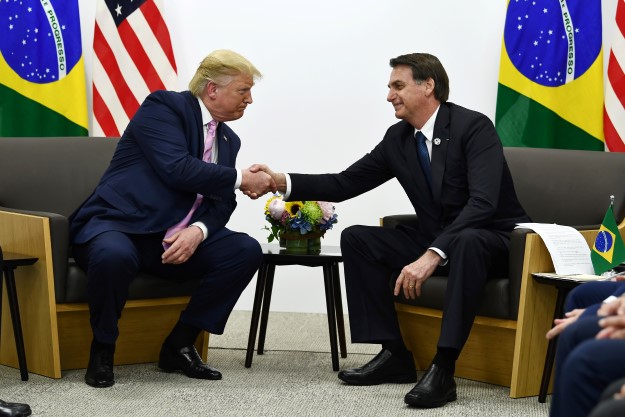Correction appended below.
George Santayana, a Spanish philosopher, in 1905 coined an oft-repeated maxim: “Those who cannot remember the past are condemned to repeat it.” Presidents Donald Trump and Jair Bolsonaro seem to think that wouldn’t be such a bad thing.
Indeed, as far as their visions for the future are concerned, the current leaders of the U.S. and Brazil have much in common. Start with each country’s position on the global economy.
Here, both Trump and Bolsonaro are focused on national, rather than international, expansion. Trump’s unachievable insistence on deals to assure a positive trade balance with all of the country’s partners is a form of 16th-century mercantilism. That this zero-sum view extends to Trump’s military posture reflects his inability to stomach shared international responsibilities.
For its part, Brazil has not yet resolved its reliance on subsidies to auto producers, and special rules for trade with Argentina. Some believe the conclusion, at last, of the lengthy negotiations of the Mercosur trade agreement with the EU reflects an important move toward lower tariffs and greater diversification. But that is not yet a done deal. Ratification will be complicated. Austria’s parliament already voted against it and French President Emmanuel Macron – embroiled in a personal dispute with Bolsonaro – may be unhappy enough to argue for EU rejection.
A second matter where both Bolsonaro and Trump are out of step with current thinking is the environment. Indeed, Trump regards climate change with virtual contempt. After saying he would pull the country out of the Paris Agreement, the U.S. was literally absent from the session at the recent G-7 meeting that discussed the issue, and now faces a UN Climate Week at home, right in New York. Neither country was scheduled to speak at the summit.
Brazil is hardly doing much better. Safeguarding the Amazon and its ability to counter C02 emissions is an international necessity. But fires and the expansion of land for agricultural and illegal lumber production have marked Bolsonaro’s first months in office. The president does not seem much concerned, though after initially blaming NGOs for the destruction of the rainforest he seems to be considering a more active public policy. Still, Foreign Minister Ernesto Araújo says “there is no climate change catastrophe” in Brazil.
The two presidents also overlap in their vision of security. Both Trump and Bolsonaro believe in a strong armed approach to reducing violence despite reams of past evidence that this won’t be successful in the long run.
In the United States, this reflects the power of the National Rifle Association in its interpretation of the Second Amendment, and its belief that war-like weapons available for sale to anyone with limited background checks are a sacred national right.
In Brazil, the government argues for greater gun access in response to widespread urban violence, one of the electorate’s principal concerns. Bolsonaro signed an executive order earlier this year to make it easier to import guns and ammunition, and tried to relax rules for rural gun owners.
Some of these similarities are unsurprising. Both Trump and Bolsonaro lead based almost solely on their personal experience. For Trump, that means buying and bankrupting gambling casinos, and forcing creditors to take most of his losses, running an airline that similarly failed, and seeking to promote his personal wealth in real estate (and golf courses).
Bolsonaro’s prime qualification seems to have been his unhappiness with former President Dilma Rousseff and more, generally, the Workers Party (PT), which he claims was leading the country to communism. His is a president of reaction, personally committed to undoing a society that he believes has gone astray and is no longer beholden to Christian values. Bolsonaro longs to eliminate what many consider to be social progress and return Brazil to a military past.
There are myriad ways in which the two presidents are similar, especially in terms of tone and style; their relationship with the press comes to mind.
But above all the antiquated vision of the future they’re trying to achieve is cause for concern.
Whether these visions will come to fruition is still an open question. Economic challenges may limit the two presidents, though here Trump may have more room to maneuver. He has presided over an economic boom that only now seems to be fading in the midst of trade and military disputes. Still, a boost in economic fortunes ahead of the 2020 elections may be his only hope for re-election (something Trump seems to acknowledge in his insistence that the Fed should cut interest rates).
In Brazil, the economy seems locked in the developing category rather than moving ahead to the long sought upper income group. The economy has stopped its descent but is far from exhibiting signs of rapid response from its record recession. Economy Minister Paulo Guedes is betting upon a free market to make all the difference. There are signs of progress in social security reform, with tax reform now to come. The trouble is that, even with reductions in Brazil’s key interest rate, now at a record low of 5.5%, effectively dealing with economic change requires longer term emphasis. Sustaining budgetary restraints seems the only way to proceed, but that is hardly enough.
In any case, what exactly would constitute success in the eyes of the two presidents is difficult to envision. Both are looking to the past for a brighter future, but their approach seems more and more out of step.
A previous version of this article misstated Brazil’s key interest rate.
—
Fishlow is professor emeritus at the University of California, Berkeley, and Columbia University. His most recent book, Agriculture and Industry in Brazil is forthcoming in English (Columbia, 2020).







